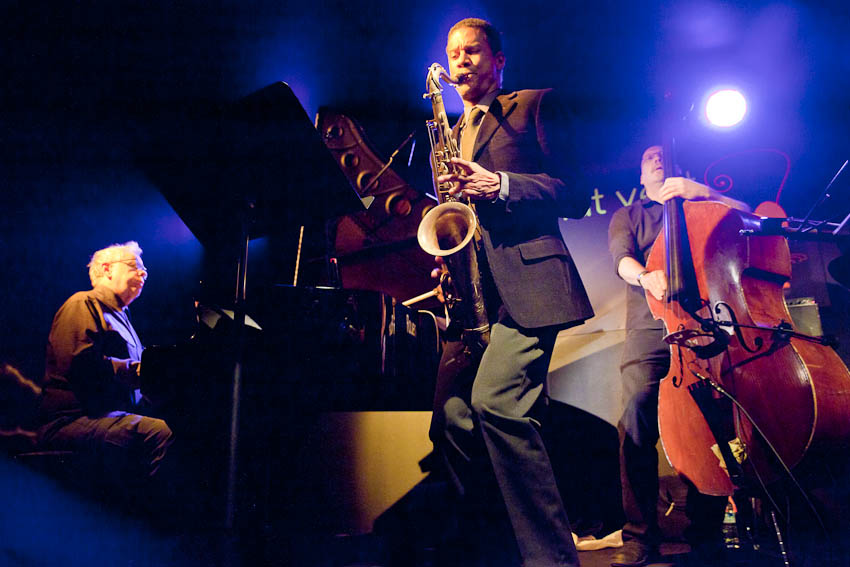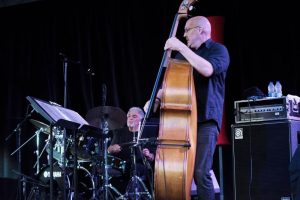24.11. – Happy Birthday !!! His forceful lines, impeccable articulation, assured sense of swing and sensitive support have made Scott Colley the bassist of choice for such jazz legends as Jim Hall, Andrew Hill and Herbie Hancock.
Colley’s remarkably empathetic skills, strong melodic penchant and improvisational daring have also served him well in groups led by colleagues Chris Potter, Greg Osby, David Binney and Adam Rogers. But it is as a composer and bandleader in his own right that Colley has flourished in recent years, as evidenced by a string of consistently impressive recordings, beginning with his 1996 debut Portable Universe, (Freelance) and continuing with 1997’s This Place (SteepleChase), 1998’s Subliminal (Criss Cross), 2000’s The Magic Line (Arabesque) and 2002’s Initial Wisdom (Palmetto).
“Although I love being a bass player,” he has said, “I look to all instruments for ideas and inspiration. I think of myself as a musician first. I’ve been privileged to play under a lot of great bandleaders and now I’m trying to add to that with projects where I have more input compositionally.”
Since Colley’s own brand of music reflects his wide ranging musical influences and experiences over the years, putting a label on it is far too limiting. “I’m not really interested in creating genre music,” he says. “I’m not even really that comfortable with calling my music jazz, although that’s one of my largest influences. But the great thing about improvised music is that it’s a language that allows for a individual to include anything that they’re interested in. And if you get with other musicians who also have that same openness, then anything is possible….any genre or idea can be entered into the mix. And to me that’s the most interesting part about what we do, placing the communication first before preconception so that we can make music together in a way that is unique to that particular time and place.”
Recognized by Down Beat as the top Talent Deserving of Wider Recognition in the magazine’s 2002 critics poll as well as a nominee in the 2003 Jazz Journalist Association Awards, Colley has been one of the most in-demand bassists on the scene, appearing on more than 80 albums to date. He has also worked with a variety of musicians from guitarists Mike Stern, Pat Metheny, John Scofield and Hall to saxophonists Joe Lovano, Michael Brecker, Clifford Jordan and Osby, pianists Hancock, Kenny Werner, Joachim Kuhn and Edward Simon, and drummers Bill Stewart, Brian Blade, Billy Hart and Roy Haynes, supplying the rich tones and driving momentum behind their music.
“I want to be involved in a lot of different music,” the thoughtful composer-bass player said in the liner notes to Subliminal. “Some music might speak to me melodically, some rhythmically, some intellectually. If I’m playing with Jim Hall one night, with Andrew Hill the next and something more groove-oriented like LAN Xang the next, it just feeds a different part of me. It’s all music I listen to and absorb in different ways. Essentially, I have my style, whatever that is. And I can subtly adapt it for many different things. I don’t think of music in terms of ‘this is inside or this is old music.’ It’s more inclusive. It comes back to listening. When you’re listening to what’s really going on and not thinking about what you think is supposed to be going on, then you get to the root of what it’s about.”
Born on November 24, 1963 in Los Angeles, California, Colley began studying bass at age 11. At 13, he began studying with Monty Budwig while simultaneously woodshedding with Paul Chambers and Charles Mingus records and playing standards two nights a week at a jam session in Pasadena. By age 16, he discovered the music of Jaco Pastorius and Charlie Haden. The towering influence of Haden’s music came into his playing through the classic recordings of Ornette Coleman. “He had the same qualities of simplicity and beauty that I appreciated in Paul Chambers,” he told writer Ted Panken in the liner notes to Subliminal . “More than that, I was impressed by his patience. He never plays anything superfluous. You get the feeling every note he plays is exactly what he means.”
From 1979 through 1981, Colley played duo gigs around L.A. with the great pianist-composer Jimmy Rowles. In 1984 he was granted a full scholarship to the California Institute for the Arts, where he focused on composition and jazz studies while also studying privately with Charlie Haden and classical bassist Fred Tinsley, of the Los Angeles Philharmonic. In 1986, he began touring and recording with jazz vocal legend Carmen McRae. He graduated Cal Arts with a Bachelor of Music degree in 1988 and soon after moved to New York City. While continuing to work with Ms. McRae through 1990, he also made U.S. and European tours with the likes of Dizzy Gillespie, Clifford Jordan, Roy Hargrove and Art Farmer. From 1991 to 1995, he performed and recorded with many bands including John Scofield, James Newton, Joe Henderson, Billy Hart, Mike Stern, and Phil Woods. From 1996 to 1998, his work included the celebrated “Grand Slam” tour with Joe Lovano, Jim Hall and Yoron Israel and a separate band featuring Toots Thielemans, Bobby Hutcherson, Billy Hart and Kenny Werner; European tours with Lost Tribe; trio concerts with Ravi Coltrane and Al Foster; trio and duo engagements with Jim Hall; various gigs in quartets led by Chris Potter, Renee Rosnes and Bob Berg; extensive touring with Andrew Hill’s “Another Point of Departure” sextet and work with Lan Xang.
For the past 3 years, Colley has toured extensively as a member of Herbie Hancock’s working trio (with drummer Teri Lynne Carrington) and two separate quartets (one featuring saxophonist Gary Thomas, the other featuring vibist Bobby Hutcherson) at concerts around the world. Hancock’s trio has also performed in concert engagements with symphonic orchestras in the United States. He says his time with Hancock has been invaluable to his growth as a musician. “Watching Herbie as a leader is really an incredible thing,” says Colley. “It’s taught me a lot about leading a band in a way that allows everyone else to express themselves. With Herbie, we talk about music all the time when we’re on the road but he never really says anything in terms of how he wants you to play. When it comes down to it, he really wants you to experiment all the time and find new things in the music every day. I think he’d rather see me try something new and screw up than play the same thing all the time. So in Herbie’s band, a certain piece of music might change from night to night to where you wouldn’t even recognize it from the beginning of the tour to the end.”
Colley’s plans for 2005 include extensive touring with “Directions in Music”, a collaboration with Micheal Brecker, Herbie Hancock, Roy Hargrove and Terri Lyne Carrington; Trio concerts with Pat Metheny; A Duo tour with Jim Hall; and with Scott’s new quartet, he will do 2 European tours, one U.S. tour, and a new CD release for the CAM record label.
“The thing that I really look for in terms of choosing projects,” says the prolific bassist-composer-bandleader, “is getting with musicians who are really interested in conversation in music; creating something that’s alive and different every single time that it’s played. I’m interested in playing with musicians who are constantly creating a dialogue in music. And in terms of composition, I’m trying to find ways to bring the most in that regard out of each musician….searching for the forms and creating structures that are suited for each individual , that give them the most freedom to play on.”







More Stories
CD review: George Benson – Dreams Do Come True: When George Benson Meets Robert Farnon – 2024: Video, CD cover
The band was tight as ever. The Warren Haynes Band cuts loose: Video, Photos
Interview with Alvin Queen: Feeling Good – I heard these tunes played by … Video, new CD cover, Photos